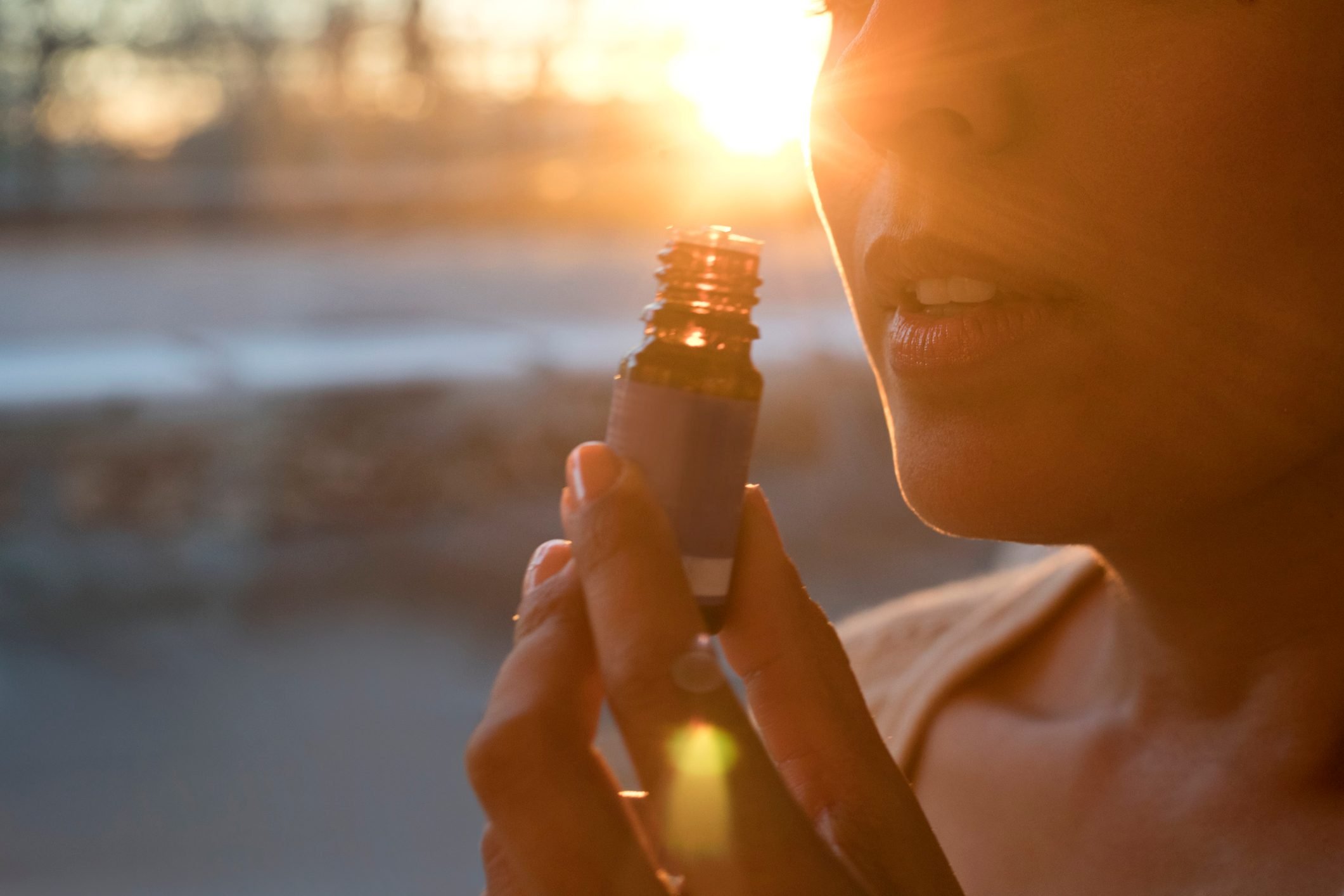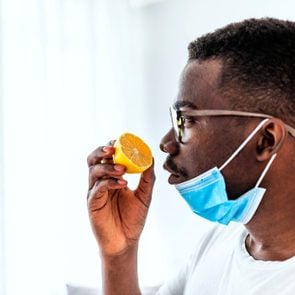Covid-19 Took This Woman’s Sense of Smell—She’s Fighting to Get It Back
Updated: Mar. 17, 2021
After Covid-19 left her with a loss of smell, or anosmia, Molly Moore is using smell training, including essential oils, to regain it.
Covid-19 and losing sense of smell
As a certified sommelier who has spent years working in the industry, Molly Moore has made wine—and her nose—a central part of her life. So when the 40-year-old came down with Covid-19, she was devastated to discover that one of the long-lasting effects of the virus was losing her ability to detect scents.
Moore, who lives and works in Denver, Colorado, didn’t have severe symptoms of Covid-19. The one thing she did suffer—anosmia, or loss of the sense of smell—has been devastating for her love of wine.
“Smell is everything when it comes to appreciating good wine. Without it, I can’t taste the floral, fruity, earthy, or woodsy tones, and it all tastes the same. It’s been my biggest disappointment from Covid,” she says. Now Moore has made it her mission to regain her sense of smell.
A rapid loss
Moore caught the coronavirus in January 2021 after a visit from an infected relative. It started with chills, exhaustion, and a headache, but those symptoms were fairly mild and resolved within a few days. On the third day, she began to notice another symptom: Her sense of smell was diminishing. (These are the Covid-19 symptoms to look for.)
She’d always been very sensitive to smells, so the difference was alarming. To monitor the condition, she pulled out a box of essential oils she keeps on hand. Lining them up on her bathroom counter, she began sniffing each one. She noticed certain smells had dropped out entirely, and she ended up putting the oils in order—from those she first lost the ability to smell to scents that she lost last.
The losses started with the lighter citrus and floral smells, followed by herbal scents like cinnamon and cloves. Strong scents like peppermint and spearmint were the last to go. The most alarming aspect is that her loss didn’t take long: Over the period of a day and a half, she completely lost her ability to smell. (Here’s what to know before buying essential oils.)
“It was pretty heartbreaking, and at first I was in denial,” she says. “But I knew it was true because if it weren’t for the labels on the bottles, I wouldn’t have known what I was holding.”
Two and a half months later, she still hasn’t completely regained her sense of smell. It seems this Covid-19 symptom has stuck around as a side effect of having the virus.
Anosmia is common
As with much of what we know about SARS-CoV-2, the virus that causes Covid-19, there’s a lot that isn’t clear. Scientists still aren’t sure exactly how it affects smell, how many people experience this symptom, or for how long.
The virus is just over one year old, and the science is still emerging. A review study published in 2020 in Mayo Clinic Proceedings found that 40 percent of people diagnosed with Covid-19 experienced olfactory dysfunction. Another study, this one published in the International Forum of Allergy and Rhinology, reported that 96 percent of people with symptomatic Covid-19 had some olfactory dysfunction, and 18 percent lost their sense of smell completely.
(Here’s what you need to know about losing your sense of smell during Covid-19.)
“What we know for sure is that this a very common symptom of Covid-19, so common that we pushed for it to be made one of the diagnostic criteria,” says Tran Locke, MD, an assistant professor of otolaryngology at Baylor College of Medicine who specializes in anosmia and is currently working with patients to regain their sense of smell after a Covid-19 infection.
Anosmia can be one of the most tenacious aftereffects of the illness. Of people who lose their sense of smell, about one-third will experience it for more than two weeks, says Dr. Locke.
“Most people regain their smell in one to two weeks, but it can take over a year and for some people, it may be permanent,” she says. It’s also possible to experience a partial recovery or to regain your sense of smell but have it feel permanently different than before.
The good news, she says, is that if you have any type of smell at all, it’s a sign that your olfactory nerve is still working.
How Covid-19 affects your sense of smell
A sudden loss of smell like Moore experienced is typical of Covid-19, says Dr. Locke. It appears to have both physiological and neurological roots.
When you smell, scent molecules travel up your nose to receptors in your sinus cavity. Your olfactory nerve then signals neurons in your brain to interpret those molecules into “smells.” SARS-CoV-2 targets and damages supporting cells that surround the neurons.
The illness can also induce a loss of smell due to inflammation or damage to the olfactory nerve itself.
Many people also experience a loss of taste as a Covid-19 symptom, but the two symptoms don’t always go together. Moore says she always maintained basic tastes: bitter, sweet, salty, sour, and umami. However, because smell is key to flavor, without it food lost most of its appeal, she says.
Regaining your sense of smell after Covid-19
After a Covid-19 infection, most people regain their sense of smell gradually, over the course of several days or weeks. Exactly how and when it happens can be very individual, says Dr. Locke. For people whose sense doesn’t return on its own, like Moore, there are techniques to help the process.
A note about safety: While you are working on regaining your sense of smell, be cognizant of what you can’t smell. “It sounds funny, but it’s easy to forget you can’t smell things like smoke, gasoline, or rotten food,” Dr. Locke says. So make sure your smoke detectors are working and have battery backups and your chemicals are safely secured. And always check the expiration dates on food before eating.

DIY smell training
Smell training has been around for decades and was developed as a way to help people with anosmia caused by other types of viral infections or head injuries. The most popular smell training protocol, as described in the journal The Laryngoscope, involves exposing yourself twice a day to four different scents, chosen for their distinct smell profiles: rose, eucalyptus, lemon, and cloves.
Smell training is designed to stimulate both the physical and the neurological systems. It helps heal parts of your olfactory system and builds new neural connections related to smelling in your brain. (Studies show that these are the smells that make people happy.)
Dr. Locke’s smell-testing instructions:
- Sit in a quiet place and take gentle sniffs of one scent for 20 seconds.
- Focus on that scent, no only with your sense of smell but also by picturing the scent in your mind.
- Put that first scent away and pause for 30 seconds to let the smell clear.
- Repeat the process with scents two through four.
- Monitor morning and night for four to six months.
Using essential oils
Thanks to her early essential oil “tests” during the process of losing her sense of smell, Moore has invented a similar smell protocol of her own, tailored just to her. Since the middle of January, she has been taking a minute several times a day to smell the scents in the reverse order of how she lost them.
It appears to be working. So far, she’s regained the ability to smell the mints, cinnamon, and cloves. However, fruits and florals are still missing, which rules out high-end wines and other favorite scents.
“This is a real bummer because if I had to pick my favorite smell in the whole world, it would be that burst of citrus you smell right when you peel a fresh orange,” Moore says, smiling at just the memory of it. “I really miss smelling oranges.”
Overall, she says she’s regained 50 to 60 percent of her sense of smell and says the smell training has definitely been helpful. “I’m very optimistic I’ll be back to full smelling soon,” she says. And she’ll be able to toast her success with a glass of good wine. In the meantime, she’s focusing on an unexpected benefit to her lost sense of smell: “On the upside, I’m buying cheaper wine, so at least we’re saving money!”
(Here are some essential oil safety tips.)
Tips for smell training
The protocol itself is simple, but there are things you can do to make it more effective, says Dr. Locke.
Use pure, unmixed oils
The more complicated the smell, the trickier it is for your brain to recognize what you are smelling. You don’t have to use the exact scents in the protocol, but you should pick ones that you know well and that haven’t been blended with other scents. Buying oils from a reputable company can help make sure they are uniformly concentrated and therefore similarly odiferous.
Smell mindfully throughout your day
The brain is a huge part of smell, so strengthen your mental connections by actively and mindfully smelling throughout your day. For instance, every time Moore makes a coffee, she sticks her face near the bag and inhales deeply while thinking of what coffee smells like. “I still can’t smell ambient coffee smells in the air, but I can smell it now when I really concentrate on it,” she says.
Flush out your sinuses
A tool Moore uses and Dr. Locke says is helpful is a neti pot or sinus irrigator, which can clear sinus cavities. This step isn’t necessary, but it can help get rid of any allergens, mucous, or debris that may be inhibiting your ability to smell. Just be sure to follow the directions for how to safely use a neti pot.
Try other scents (carefully)
It’s important to have a few regulated scents that you use every day as a way to measure progress, but as your sense of smell improves, challenge it by adding other (pure, unmixed) scents. Avoid scents that may be toxic, like bleach, markers, or gasoline.
Ask for help
Sometimes smells can be too intense or too mild, but it may be hard for you to tell. Ask a loved one with a working sense of smell to sniff your oils occasionally to make sure they are good and not rancid or overwhelming.
Start early
The sooner you start the smell training protocol, the faster and better it will work. Time is of the essence when it comes to maintaining and rebuilding neural connections.
Do it more often
Twice a day is the minimum number of tests recommended, but feel free to do it more often throughout the day. While you don’t want to go overboard, more practice means more chances to build neural connections.
Be patient
Most people lose their smell relatively quickly. There’s no similarly established set of time it takes for the majority of people to get their sense of smell back. How long it takes to recover the sense of smell differs from person to person, sometimes taking over a year. So it’s important to be patient with the process.
Keep a diary
Write down which scents you can smell, how much you smell them, when you began to smell the scent, and any other treatments or smells you are trying. Not only will this help you see even small progress, but it also can be invaluable if you end up needing to see a doctor.
Manage your expectations
“You’re basically learning a new smell vocabulary, so what you once thought of as the smell of a rose may smell slightly different now,” says Dr. Locke. “Sometimes that can worry people, but it’s not wrong. It’s just different.”
(Try these other methods to sharpen your sense of taste and smell.)
Know when to see a doctor
If you’ve been trying for more than two weeks and have not regained any sense of smell, it’s time to see a doctor, says Dr. Locke. There are many reasons people can experience a loss or reduction of smell, and your doctor will want to rule these out or treat them. They may include other viral infections, fungal sinusitis, inflammatory sinus disease, tumors, and seasonal allergies.
Other remedies for smell loss
The Internet is full of alternate methods and recipes for regaining a lost sense of smell, but there aren’t any that have been backed by science. You should be very cautious about trying these techniques. While some are relatively harmless (taking omega-3 supplements), others can be painful or damaging (squirting lemon juice up your nose). Always talk to your doctor before trying a new treatment.

















